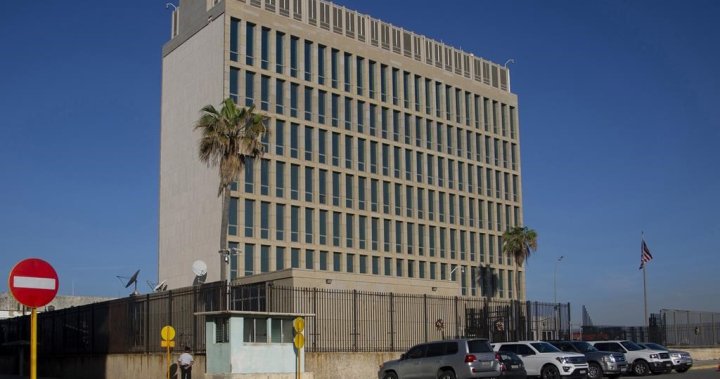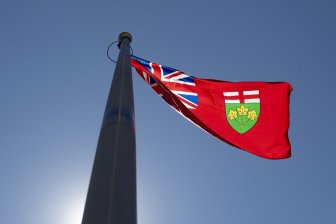A lawyer for Canadian diplomats suing the federal government over what’s become known as “Havana syndrome” is criticizing a report about the matter from a major American health institute.
A report from the U.S. National Institutes of Health, a collection of leading American research centres, concluded “there was no significant differences between individuals reporting (Havana syndrome symptoms) and matched control participants” in most measures “except for objective and self-reported symptoms like balance, fatigue and post-traumatic stress,” among other issues.
Paul Miller, who represents diplomats alleging in the lawsuit that they suffered concussion-like symptoms during service at the Canadian Embassy in Havana, Cuba, said the report has a number of failings.
“If a diplomat or a family member is impacted by something that happens, the Canadian government has to stop relying upon a broken worker’s compensation system and actually step up and provide the treatment,” Miller told Global News.
He said the study took place too long after diplomatic staff and family members reported the onset of symptoms, that examining patients beyond Cuba did not give accurate findings on those who say they began experiencing symptoms in Havana and that the report did not have data on the affected people’s physical baselines before they began experiencing the symptoms.
“(Their symptoms) may not be as severe now,” he said, “but it’s still there.”
Another study, also published on Monday, found no significant differences in MRI brain scans between those who reported being affected with “Anomalous Health Incidents” (or AHIs, the term often used in medical exams and studies related to reports of Havana syndrome) and a group of people also tested who didn’t report any the symptoms.
American and then Canadian embassy staff, as well as their family members stationed there, in Havana reported suffering headaches and cognitive and vision problems in 2017.
Breaking news from Canada and around the world
sent to your email, as it happens.
Breaking news from Canada and around the world
sent to your email, as it happens.
The U.S. State Department initially said the reports of strange symptoms appeared to be caused by “targeted actions.” The CIA later said it was “very unlikely” a foreign adversary was responsible and that it found no evidence any American adversary has a weapon or device capable of causing such symptoms.
Testing on the American staff showed they had less white matter in their brains, along with other structural differences, than a comparison group of healthy people.
Internal government documents, which Global News obtained under access to information laws, appear to corroborate claims currently in court that officials were working to keep early reports of symptoms quiet.
American and Canadian diplomatic staff later sued their respective governments, alleging a failure to protect them.
Global Affairs Canada previously acknowledged that nine adults and five children from diplomatic families reported developing unusual symptoms.

Miller, who represents Canadian diplomats in the $28-million suit, said the embassy staff and their families are still dealing with the symptoms and are trying to get proper care.
“We have clients who have gone into serious debt trying to seek out the best treatment for their kids in the United States,” he said, speaking from Toronto.
“The Canadian government does nothing. And it’s absolutely shocking.”
The first NIH study examined 86 government staff and family members with reported symptoms from Cuba as well as Austria, China and other locations between June 2018 and July 2022, along with 30 other U.S. government participants with no reported symptoms to compare them.
It said “the absence of a consistent set of abnormalities” among those reporting symptoms suggests that, “if a directed energy ‘attack’ is truly involved, it seems to create symptoms without persistent or detectable physiological changes.”
It also suggested those with symptoms may be experiencing the results of an injury that is no longer detectable.

Miller said the Canadian government has until early April as part of the lawsuit to provide internal documents in which he says staff discussed the situation and reports of symptoms in Havana and that he is trying to arrange for a government representative to be questioned.
Global News asked the NIH for comment but did not hear back by deadline.
Global Affairs Canada, in a statement, said it is aware of the NIH report.
“Canadian diplomatic staff and their families have Global Affairs Canada’s unwavering support,” spokesperson John Babcock wrote.
He said the government continues to acknowledge “the very real experiences and veracity of the reports of the symptoms and illness that our colleagues and family have reported” but said he cannot comment on individual cases for privacy and security reasons.
Babcock said the government can’t comment on the cause of the reported symptoms because the matter is before the courts.
— with files from Global News’ Amanda Connolly, The Canadian Press’s Jim Bronskill, Reuters’ Deena Beasley and The Associated Press’s Lindsey Tanner and Megan Janetsky
© 2024 Global News, a division of Corus Entertainment Inc.










